22 Mar2022
By AACTE
 Today, AACTE (American Association of Colleges for Teacher Education) releases the second edition of Colleges of Education: A National Portrait. In addition to updating information on colleges of education and their leaders, faculty, and students, this edition features a special analysis on the contributions of community colleges to educator preparation.
Today, AACTE (American Association of Colleges for Teacher Education) releases the second edition of Colleges of Education: A National Portrait. In addition to updating information on colleges of education and their leaders, faculty, and students, this edition features a special analysis on the contributions of community colleges to educator preparation.
This update of AACTE’s signature report offers a comprehensive picture of the nation’s schools, colleges, and departments of education: the work that they do, the people who do that work, and the students they serve. The report describes the key trends and challenges in meeting the nation’s need for highly skilled educators.
Colleges and universities can benchmark their programs against peers, gain innovative ideas to grow and diversify enrollment through community college partnerships, and describe to stakeholders the challenges confronting educator preparation.
15 Mar2022
By Nicole Dunn

You may have heard the term “intersectionality” a lot lately, a term coined by Kimberlee Crenshaw in 1989 to describe how systems of oppression overlap to create distinct experiences for people with multiple identity categories. Those familiar with Crenshaw’s work know that the term was once used academically purely to shape legal conversations about racial and social injustice in systems, most notably policing. Now, “intersectionality” is part of the national lexicon, being used in the forefront of the country’s debates around racial and social injustice in the last few years; however, that should not dissuade educators from looking at their work through this lens.
For educators, intersectionality is used to frame the experiences of historical and current figures who have multiple identities when they teach. For example, during Women’s History Month, it’s important for educators to consider how the experiences of women of color, queer and trans women, women with disabilities, women with different body types, and multi-lingual women differ, and then represent them as such in their curriculum. Educators can build this intersectional teaching muscle by having conversations about their diverse experiences with one another and, as teachers, share research and resources that elevate the truth of women with intersectional identities in our schools. This is why, on International Women’s Day, we asked several of our members and staff to answer the question:
Why is integrating women’s history through an intersectional lens important to you and your work in education?
08 Mar2022
By Nicole Dunn

AACTE launches it celebration of 2022 Women’s History Month on International Women’s Day with a blog on the “herstory” of women leaders in education preparation. To help AACTE celebrate women leaders in the profession, please nominate a women-identified leader in educator preparation whom you would like us to recognize in Ed Prep Matters before the month ends.
The term “herstory” was coined in 1970 by Robin Morgan, editor of Sisterhood is Powerful, An Anthology of Writings from the Women’s Liberation Movement. It is used today to acknowledge the way in which women have been left out of our historical narratives. Most schools teach history through the lens of America’s default norms: white, cisgendered, and male. AACTE is committed to supporting its membership with their efforts to prepare candidates to equitably represent intersectional female narratives across disciplines.
08 Mar2022
By Jacqueline E. King, Ph.D.
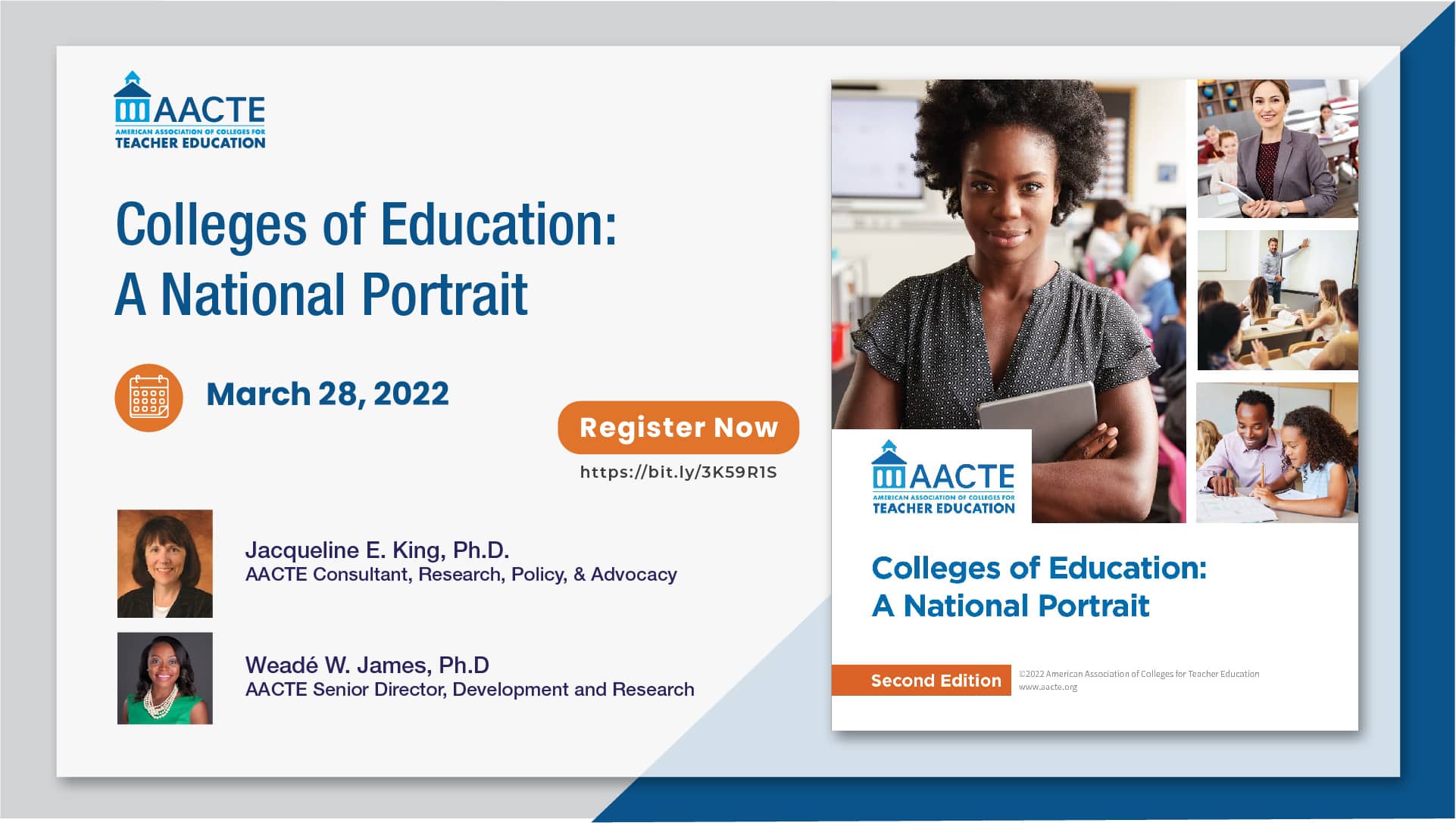 AACTE will soon release the second edition of its signature report, Colleges of Education: A National Portrait. In addition to updating information on colleges of education and their leaders, faculty, and students, this edition features a special analysis on the contributions that community colleges make to educator preparation. Topics to be covered will include:
AACTE will soon release the second edition of its signature report, Colleges of Education: A National Portrait. In addition to updating information on colleges of education and their leaders, faculty, and students, this edition features a special analysis on the contributions that community colleges make to educator preparation. Topics to be covered will include:
- Scope of educator preparation in the U.S.
- Trends in undergraduate and graduate degrees conferred in education
- Demographics of leaders and faculty
- Student demographics
- Contributions of community colleges to educator preparation
22 Feb2022
Driving the National Conversation to Recruit, Sustain, and Retain Diverse Teaching Candidates
By Amanda Morales
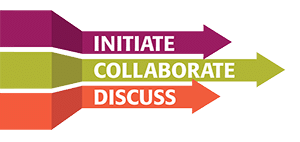 The AACTE Diversified Teacher Workforce Topical Action Group (TAG) will convene Pk-20 practitioners, researchers, and community stakeholders to discuss how to bolster collective efforts to recruit, sustain and retain teachers of color. The preconference event will take place on Thursday, March 3 at the Sheraton New Orleans Hotel, Grand Ballroom B, 9:00 a.m. – 3:30 p.m.
The AACTE Diversified Teacher Workforce Topical Action Group (TAG) will convene Pk-20 practitioners, researchers, and community stakeholders to discuss how to bolster collective efforts to recruit, sustain and retain teachers of color. The preconference event will take place on Thursday, March 3 at the Sheraton New Orleans Hotel, Grand Ballroom B, 9:00 a.m. – 3:30 p.m.
Across the field of education (PK-20) students, teachers, administrators, teacher educators/professors, and program leaders continue to witness and lament the chronic disparities in representation and lack of ethno-racial and linguistic diversity among teachers (relative to their students) in our nation’s schools. And in the wake of a global pandemic, enduring civil unrest, the impending mass teacher exodus, and calls for racial justice related to systemic anti-Black, anti-Asian and anti-immigrant sentiments within all aspects of society, educational institutions are being forced to engage in introspection with greater magnitude. Teacher preparation programs in particular are feeling increased pressure to recruit, retain and effectively prepare a highly-qualified, racially-literate, and ethno-racially diverse pool of candidates as districts scramble to hire teachers with the content knowledge and pedagogical skills as well as the cultural and linguistic competencies needed to meet the needs of today’s students.
18 Feb2022
By Dawn Williams
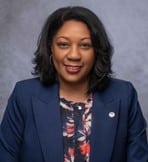 This post is part of AACTE’s Black History Month 2022 Blog series.
This post is part of AACTE’s Black History Month 2022 Blog series.
As we are nearing the end of another Black History Month, this year somehow feels different. On one hand the increased representation of diversity in marketing and corporate settings is promising. On the other hand, the resurgence of attacks on the use of school curriculum that represents diverse lived experiences is troubling. We find ourselves fighting a history of structural racism while also trying to safeguard our health against a global pandemic. However, what has not changed is our steadfast commitment to “balance the scales for the disenfranchised and promote an America that is devoid of inequalities.”
15 Feb2022
By Nicole Dunn
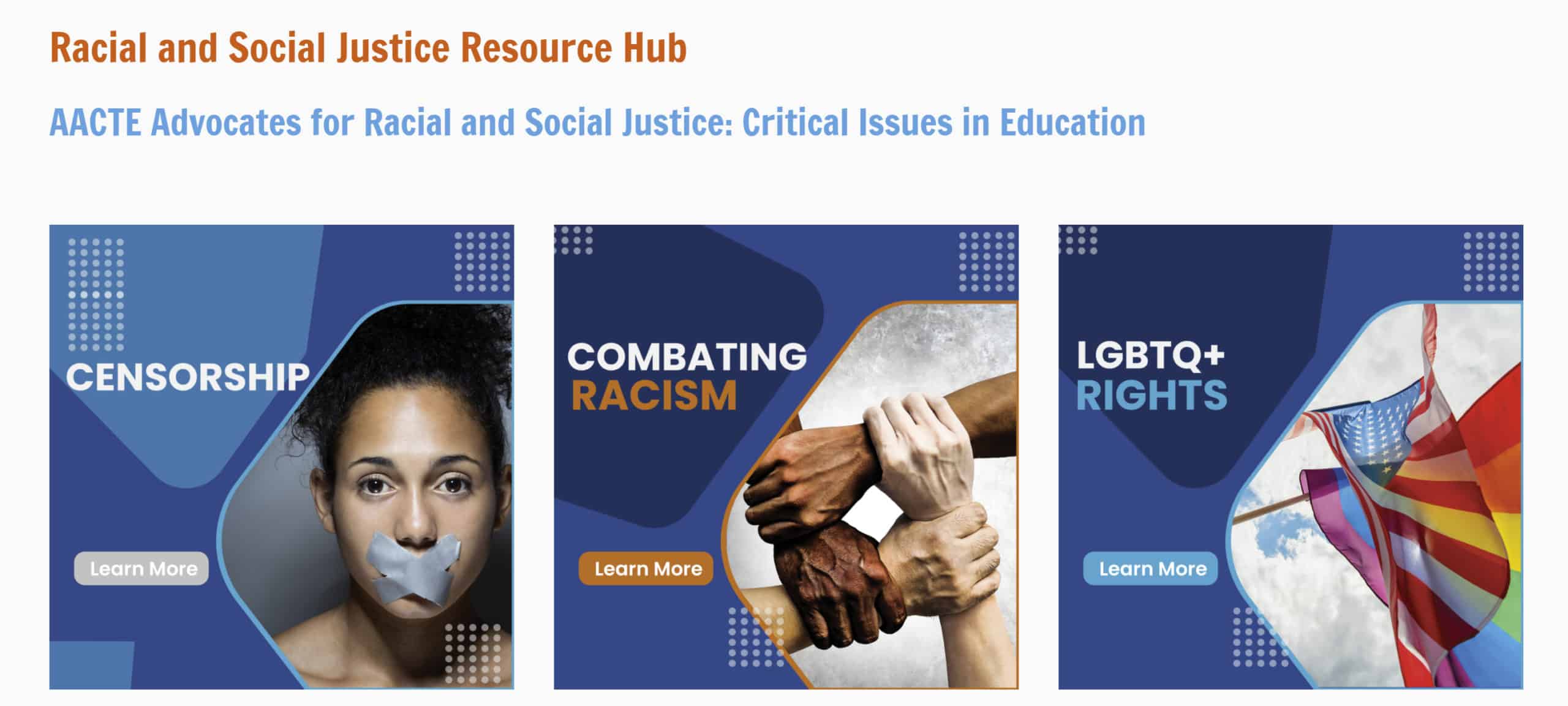 This month, AACTE launched its Racial and Social Justice Hub, a place to learn, grow, inquire, and share resources with one another that address social injustices and advocate for the preparation of profession-ready educators. To help ensure AACTE is meeting the needs of the educator preparation community in advancing racial and social justice work, you are invited to complete a 90-second survey to inform future content – it’s not for you, without you.
This month, AACTE launched its Racial and Social Justice Hub, a place to learn, grow, inquire, and share resources with one another that address social injustices and advocate for the preparation of profession-ready educators. To help ensure AACTE is meeting the needs of the educator preparation community in advancing racial and social justice work, you are invited to complete a 90-second survey to inform future content – it’s not for you, without you.
11 Feb2022
By Fernanda Pires and Danielle Dimcheff
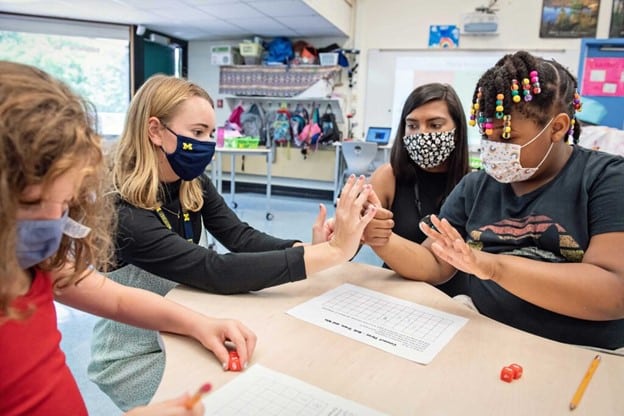
Students in the Master of Arts with Elementary Teacher Certification program work with elementary school students at Ann Arbor Open School in July 2021. Image credit: Leisa Thompson
With a $14.7 million gift, University of Michigan alumna Eileen Lappin Weiser will establish a new center at the U-M School of Education to make learning accessible to all youth.
Her gift, representing the largest commitment in the School of Education’s 100-year history, will help reshape teaching and learning to meet the needs of all different kinds of learners and prepare them for the jobs of the future.
The Eileen Lappin Weiser Learning Sciences Center will strengthen the connections between research and practice by engaging numerous partners to study the many places and ways that learning happens. This will involve the design and testing of curricula for diverse learners, collaboration with teachers and administrators to promote evidence-based practices, and efforts to scale successful education solutions to be available to all learners.
08 Feb2022
By Anthony Webster
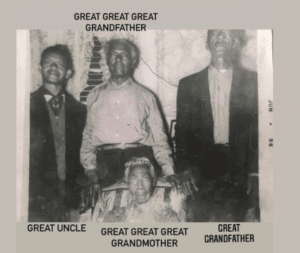
This post is part of AACTE’s Black History Month 2022 Blog series.
Every February, during Black History Month, we celebrate the countless contributions and achievements of notable Black inventors, educators, lawyers, and politicians from over the years. However, as I reflect, I remember to pay homage to the heroes and sheroes in my life who sacrificed to create a better tomorrow, from the Black teachers who inspired me during my PK-12 journey to the Black professors at my HBCU (Jackson State) who saw my potential and pushed me beyond my comfort zone. Because of them, I knew that getting to this point was possible.
08 Feb2022
By Nicole Dunn and Jacqueline Rodriguez
 AACTE is committed to tackling systematic censorship within our country’s education system, alongside our members and partners, and it does so through an intersectional lens.
AACTE is committed to tackling systematic censorship within our country’s education system, alongside our members and partners, and it does so through an intersectional lens.
As an organization whose mission is to revolutionize education for all learners, AACTE developed the Racial and Social Justice Resource Hub to be a place for members to learn, grow, inquire, and share resources with one another that address social injustices and advocate for the preparation of profession-ready educators.
The Hub includes three sections: Education Censorship, Combating Racism, and LGBTQ+ Rights. Each section offers resources created by AACTE and its members and strategic partners, including articles, webinars and workshops, curriculum tools, and calls for action. Considering the ongoing efforts underway that limit educators’ teaching and discussion of our nation’s history, and other so-called divisive topics, AACTE is encouraging members to engage with the Hub to support your own teaching and scholarship.
07 Feb2022
By Kaitlyn Brennan
 This weekly Washington Update is intended to keep members informed on Capitol Hill activities impacting the educator preparation community. The views expressed in this post do not necessarily reflect the views of AACTE.
This weekly Washington Update is intended to keep members informed on Capitol Hill activities impacting the educator preparation community. The views expressed in this post do not necessarily reflect the views of AACTE.
While it feels like there has been sand in the gears surrounding movement on FY22 appropriations and the Build Back Better Act- Congress may be on a path to more forward movement in the coming weeks. We expect there could be movement in the House next week to address the Continuing Resolution (CR) which expires on February 18th. Now is the time for advocates to be at the table expressing the critical need for the proposed historic investments in education funding.
01 Feb2022
By Nicole Dunn

Join AACTE in celebrating Black History Month by sharing your favorite resources for teaching Black history at the Ed Prep or PK-12 level. AACTE will compile this shared knowledge as a toolkit for teaching Black history every month of the year. Please take a moment to share your resources.
This post is the first of AACTE’s weekly Black History Month 2022 Blog series to celebrate members’ essential efforts to increase the representation of Black History in America’s schools. As a kickoff to the celebration, AACTE is releasing, for a limited time to the public, a recording of AACTE’s 2021 Annual Meeting Deeper Dive session, The 1619 Project.
Founding director of the Smithsonian’s National Museum of African American History and Culture, Lonnie Bunch, describes the museum as a place that “transcends the boundaries of race and culture that divide us and becomes a lens into a story that unites us all.” That is a powerful statement, and one AACTE and its members strive to emulate as it celebrates Black History, not just this month, but every day as AACTE advocates for curriculum and policies that are representative of the country’s diverse history.
Black History Month began as an effort to increase the representation in history classes of Black people’s contributions to America’s society, culture, and progress as a nation. Its origin lies in the thesis of Carter G. Woodson. According to an adaption of the National Museum of American History’s blog exhibit on Dr. Woodson, he was challenged by his dissertation advisors, who, according to Dr. Woodson, cautioned him time and again not to “undertake research that the Negro had a history.” Woodson knew that education is essential to social change — and AACTE honors that as part of its mission.
28 Jan2022
By Jacqueline Rodriguez
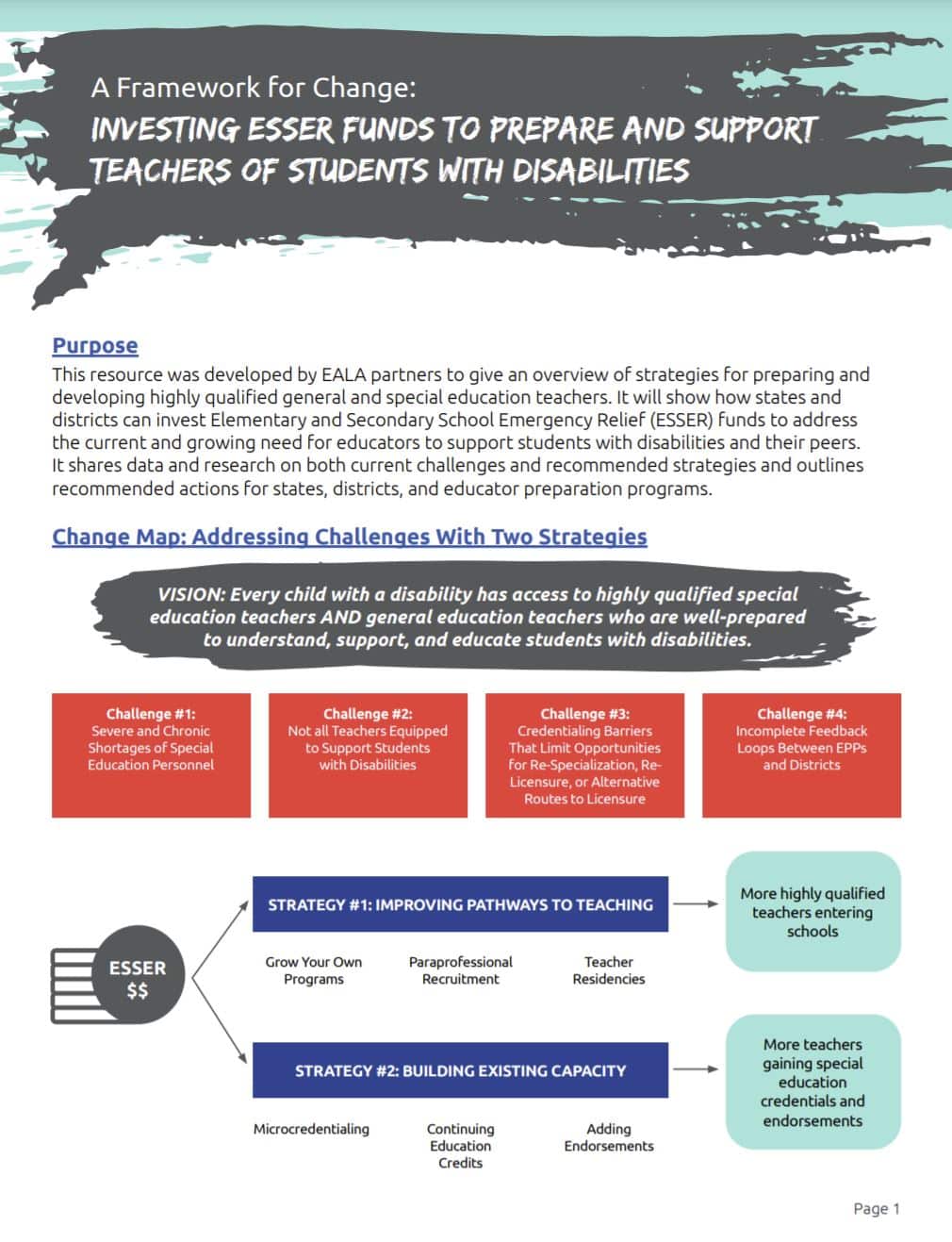 AACTE joined the Educating All Learners Alliance (EALA) in 2020 as the pandemic gave rise to the growing challenges to teaching students with learning differences online. The Alliance steadfastly supports PK-20 students through resource development, including the newest resource: A Framework for Change: Investing ESSER Funds to Prepare and Support Teachers of Students With Disabilities.
AACTE joined the Educating All Learners Alliance (EALA) in 2020 as the pandemic gave rise to the growing challenges to teaching students with learning differences online. The Alliance steadfastly supports PK-20 students through resource development, including the newest resource: A Framework for Change: Investing ESSER Funds to Prepare and Support Teachers of Students With Disabilities.
This resource was developed by EALA partners to give an overview of strategies for preparing and developing highly qualified general and special education teachers. It will show how states and districts can invest Elementary and Secondary School Emergency Relief (ESSER) funds to address the current and growing need for educators to support students with disabilities and their peers. It shares data and research on both current challenges and recommended strategies and outlines recommended actions for states, districts, and educator preparation programs.
27 Jan2022
By Marybeth Gasman

PHOTO CREDIT: VON HARRIS PRODUCTIONS
This article originally appeared in Forbes and is reprinted with permission.
In 2020, vast changes in higher education due to racial justice movements and the impact of Covid-19, resulted in colleges and universities clamoring to respond with diversity, equity, and inclusion (DEI) efforts. One aspect of this response came in the form of newly elected African American student body presidents and student leaders. Whereas the majority of these posts had been held by White students for decades, the “interlocking” of COVID-19 and racial justice turmoil prompted Black students to create platforms for change on their campuses, and as a result their classmates elected them to leadership positions.
25 Jan2022
By Margaret Gerry
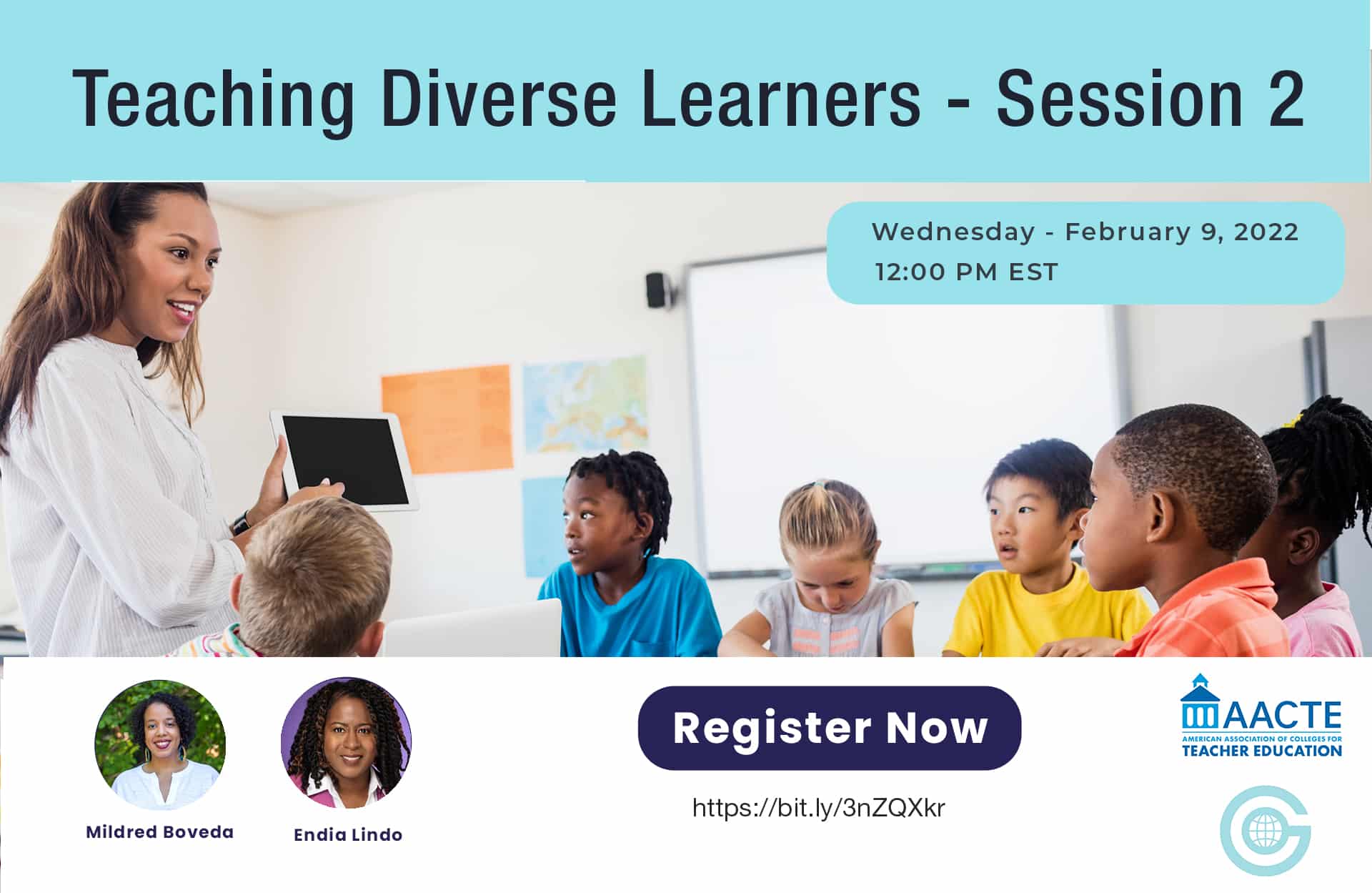 The current demographics in the United States public school workforce are not representative of all students in American classroom settings. Though American classroom settings continue to grow in diversity, the teaching workforce remains predominantly white, middle class, and female. These racial inequalities in classroom settings may lead to biases, stereotype threats, and a need for more inclusive environments, thereby impacting student experiences in school settings in areas such as grades, disciplinary referrals, and teacher expectations of students. Across the field of education, stakeholders, including AACTE, are attempting to diversify the field in an attempt to improve the ability of our current teaching workforce to support their students who have different experiences from their own. In an era where, in the United States, our classrooms have never been more diverse with students from multiple cultures, socio-economic levels, and students with disabilities, how can we best prepare teachers to support all students in classroom settings?
The current demographics in the United States public school workforce are not representative of all students in American classroom settings. Though American classroom settings continue to grow in diversity, the teaching workforce remains predominantly white, middle class, and female. These racial inequalities in classroom settings may lead to biases, stereotype threats, and a need for more inclusive environments, thereby impacting student experiences in school settings in areas such as grades, disciplinary referrals, and teacher expectations of students. Across the field of education, stakeholders, including AACTE, are attempting to diversify the field in an attempt to improve the ability of our current teaching workforce to support their students who have different experiences from their own. In an era where, in the United States, our classrooms have never been more diverse with students from multiple cultures, socio-economic levels, and students with disabilities, how can we best prepare teachers to support all students in classroom settings?
 Today, AACTE (American Association of Colleges for Teacher Education) releases the second edition of Colleges of Education: A National Portrait. In addition to updating information on colleges of education and their leaders, faculty, and students, this edition features a special analysis on the contributions of community colleges to educator preparation.
Today, AACTE (American Association of Colleges for Teacher Education) releases the second edition of Colleges of Education: A National Portrait. In addition to updating information on colleges of education and their leaders, faculty, and students, this edition features a special analysis on the contributions of community colleges to educator preparation.








 AACTE will soon release the second edition of its signature report, Colleges of Education: A National Portrait. In addition to updating information on colleges of education and their leaders, faculty, and students, this edition features a special analysis on the contributions that community colleges make to educator preparation. Topics to be covered will include:
AACTE will soon release the second edition of its signature report, Colleges of Education: A National Portrait. In addition to updating information on colleges of education and their leaders, faculty, and students, this edition features a special analysis on the contributions that community colleges make to educator preparation. Topics to be covered will include: The AACTE Diversified Teacher Workforce Topical Action Group (TAG) will convene Pk-20 practitioners, researchers, and community stakeholders to discuss how to bolster collective efforts to recruit, sustain and retain teachers of color. The preconference event will take place on Thursday, March 3 at the Sheraton New Orleans Hotel, Grand Ballroom B, 9:00 a.m. – 3:30 p.m.
The AACTE Diversified Teacher Workforce Topical Action Group (TAG) will convene Pk-20 practitioners, researchers, and community stakeholders to discuss how to bolster collective efforts to recruit, sustain and retain teachers of color. The preconference event will take place on Thursday, March 3 at the Sheraton New Orleans Hotel, Grand Ballroom B, 9:00 a.m. – 3:30 p.m.  This post is part of AACTE’s Black History Month 2022 Blog series.
This post is part of AACTE’s Black History Month 2022 Blog series. This month, AACTE launched its
This month, AACTE launched its 

 This weekly Washington Update is intended to keep members informed on Capitol Hill activities impacting the educator preparation community. The views expressed in this post do not necessarily reflect the views of AACTE.
This weekly Washington Update is intended to keep members informed on Capitol Hill activities impacting the educator preparation community. The views expressed in this post do not necessarily reflect the views of AACTE. 
 AACTE
AACTE 
 The current demographics in the United States public school workforce are not representative of all students in American classroom settings. Though American classroom settings continue to grow in diversity, the teaching workforce remains predominantly white, middle class, and female. These racial inequalities in classroom settings may lead to biases, stereotype threats, and a need for more inclusive environments, thereby impacting student experiences in school settings in areas such as grades, disciplinary referrals, and teacher expectations of students. Across the field of education, stakeholders, including AACTE, are attempting to diversify the field in an attempt to improve the ability of our current teaching workforce to support their students who have different experiences from their own. In an era where, in the United States, our classrooms have never been more diverse with students from multiple cultures, socio-economic levels, and students with disabilities, how can we best prepare teachers to support all students in classroom settings?
The current demographics in the United States public school workforce are not representative of all students in American classroom settings. Though American classroom settings continue to grow in diversity, the teaching workforce remains predominantly white, middle class, and female. These racial inequalities in classroom settings may lead to biases, stereotype threats, and a need for more inclusive environments, thereby impacting student experiences in school settings in areas such as grades, disciplinary referrals, and teacher expectations of students. Across the field of education, stakeholders, including AACTE, are attempting to diversify the field in an attempt to improve the ability of our current teaching workforce to support their students who have different experiences from their own. In an era where, in the United States, our classrooms have never been more diverse with students from multiple cultures, socio-economic levels, and students with disabilities, how can we best prepare teachers to support all students in classroom settings?